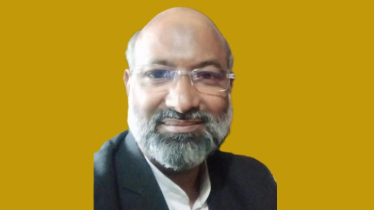
Photo: Milima Islam Biswas Mili
To regain the economic staqbility, comprehensive reforms are urgently needed to strengthen the rule of law, ensure government accountability, and restore the independence of democratic institutions. Only through such measures can the country hope to regain trust in its institutions, stabilize the economy, and build a more just and equitable society.
Dr. Yunus’s contributions remain vital in offering a path forward for economic resilience at the grassroots level. His emphasis on social business and sustainable development provides a model that could be scaled up to address some of the larger economic challenges facing Bangladesh. Nonetheless, the country's future stability will depend on broader economic reforms and effective governance to manage debt, foster sustainable growth, and prevent an economic collapse.
The country's economic stability is under significant strain, highlighted by a troubling foreign exchange reserve situation. Currently, reserves stand at approximately US$ 20 billion, but many experts argue that this figure is largely theoretical. The reality is an acute dollar crisis that hampers external trade and exacerbates the difficulties faced by businesses.
The current economic landscape is characterized by severe disruptions caused by ongoing quota protests, compounding existing financial challenges. This column examines how these disruptions are affecting key sectors of the economy and the potential path to recovery under the interim government led by Dr. Yunus.
The discrepancy between the reported reserve levels and the practical availability of foreign currency has created a bottleneck for international transactions. Importers struggle to open new Letters of Credit (LCs), crucial for sourcing raw materials and capital machinery. This shortage is stifling industrial production and affecting the overall economic health.
The industrial sector, vital for GDP contribution and job creation, is severely impacted. The lack of imported raw materials and capital equipment means that production is constrained, leading to a decline in output and profitability. Consequently, this has a cascading effect on employment, with industrial units unable to generate new job opportunities.
Small and medium-sized enterprises (SMEs) and micro businesses, often the backbone of the economy, have also faced significant disruptions. These businesses are highly vulnerable to supply chain issues and financial instability, which has led to widespread operational difficulties and, in some cases, business closures.The interim government led by Dr. Yunus has taken charge with the promise of economic stabilization. There is cautious optimism that under this new leadership, the country can address its immediate economic challenges and work towards long-term recovery.
The interim government's primary task will be to address the foreign exchange reserve issue and stabilize the currency situation. Implementing effective monetary policies and negotiating with international financial institutions may help alleviate the dollar crisis.
To rejuvenate the industrial sector, the government may need to facilitate the import of essential raw materials and machinery. It is crucial to support for businesses, including financial aid and incentives, could help boost production and employment.
Special attention will be required to support SMEs and micro businesses. Measures such as easier access to credit, supply chain support, and targeted financial assistance could help these businesses recover and thrive.
The economy of Bangladesh Sheikh Hasina's departure from the office has left Bangladesh facing severe economic challenges. Her tenure, marked by controversial policies and corruption allegations, culminated in a major bank robbery scandal that exposed significant vulnerabilities in the country's financial system. This scandal, alongside other issues, has contributed to a broader economic crisis that the nation is now struggling to overcome.
When Sheikh Hasina assumed power in 2009, Bangladesh's government debt was Tk 2.76 lakh crore. By the time she left office, this figure had ballooned to Tk 18.35 lakh crore, a substantial increase driven by both domestic and foreign borrowing. Allegations of widespread corruption, particularly in the banking sector, have also marred her tenure. It is reported that during her time in office, approximately $149.20 billion (Tk 14,920 crore) was illicitly transferred out of the country, exacerbating the economic situation.
Under Hasina’s leadership, Bangladesh’s political landscape shifted towards authoritarianism, earning her the label of "Dictator Hasina" among critics. One of the most significant scandals was the theft of $81 million from the Bangladesh Bank’s account at the Federal Reserve Bank of New York in 2016. Though carried out by international hackers, the incident exposed deep flaws in Bangladesh’s financial security and governance, leading to a decline in foreign direct investment and further economic instability. The scandal also highlighted systemic issues such as weak regulatory oversight and the politicization of institutions, which have undermined confidence in the country’s economy.
The robbery of $81 million from Bangladesh Bank in 2016 exposed significant flaws in the country's financial system, revealing the corruption and mismanagement that critics say have characterized Sheikh Hasina's leadership. This scandal, along with other issues, forced the government to cut social spending, severely affecting public services like healthcare, education, and social welfare, especially for the poor and marginalized communities.
Under Hasina's rule, democratic institutions and human rights in Bangladesh have declined. The judiciary, media, and civil society have been undermined, with dissent often suppressed through intimidation and imprisonment. This concentration of power has created a climate of fear, allowing corruption and abuse of authority to go unchecked.
The robbery is seen not just as a financial crime but as a symbol of the broader deterioration in Bangladesh’s governance under Hasina. It highlights the need for reforms to restore transparency, accountability, and the rule of law to rebuild trust in the country's institutions and foster a more stable and equitable society.
The Bangladesh Bank robbery has had far-reaching consequences, eroding trust in the country's financial system both domestically and internationally. This loss of confidence has slowed foreign investment, further complicating Bangladesh's economic challenges and hindering sustainable growth.
The scandal highlights broader governance issues, with critics pointing to negligence and a lack of accountability as products of a political environment where oversight has been weakened under Sheikh Hasina's leadership. The robbery is seen as a clear indictment of the corruption, mismanagement, and political interference that have compromised the country's financial system.
The situation underscores the urgent need for reforms to restore transparency, accountability, and institutional integrity in Bangladesh if the country is to recover from the damage done during this period.
The 2016 Bangladesh Bank robbery severely impacted the country's financial system, causing a dramatic loss of confidence both domestically and internationally. This eroded trust led to a significant decline in foreign direct investment (FDI), which further destabilized Bangladesh's economy, heavily reliant on such investments.
The incident not only exposed security flaws but also highlighted deep systemic issues within the financial sector, including weak regulatory oversight, lack of accountability, and the politicization of institutions. These factors drove capital flight, worsening economic conditions, devaluing the Bangladeshi Taka, and contributing to rising inflation.
The economic instability caused by the robbery had far-reaching social consequences. As the economy weakened, the government found itself with little choice but to cut back on social spending. This austerity led to a decline in critical public services, including healthcare, education, and social welfare programs. The impact of these cuts was felt most acutely by the poor and marginalized segments of society, who were already vulnerable. The reduction in social services exacerbated existing inequalities, deepening poverty and contributing to rising social unrest.
The robbery thus stands as a stark example of how a single event can have a ripple effect, destabilizing both the economy and society at large. The immediate financial loss was only the beginning; the long-term effects have been felt in the erosion of public trust, the weakening of the economy, and the increased suffering of the most vulnerable members of society. The Bangladesh Bank heist serves as a sobering reminder of the importance of strong, transparent financial institutions and the devastating consequences when they are undermined by corruption and mismanagement.
The economic damage inflicted by the Bangladesh Bank robbery in 2016 was only a part of the broader challenges facing the country. The impact of this event was compounded by the authoritarian rule of Prime Minister Sheikh Hasina, under whose leadership Bangladesh has experienced a systematic erosion of democratic institutions and human rights. The judiciary, media, and civil society, which are essential pillars of any democratic society, have been systematically undermined, with critics of the regime often silenced through harassment, imprisonment, and violence.
The concentration of power within the hands of Hasina and her close associates has fostered a culture of impunity, where corruption and the abuse of power often go unpunished. This has created a climate of fear and repression across the country, stifling dissent and eroding the trust between the government and the people. The unchecked power of the ruling elite has allowed corruption to flourish, further weakening the integrity of Bangladesh's institutions and deepening the country's socio-political crises.
Bangladesh's social fabric has been severely strained under Sheikh Hasina's rule due to the government's harsh suppression of political opposition and dissent. The state has frequently used police and intelligence agencies to silence critics, leading to widespread human rights abuses, including arbitrary arrests, enforced disappearances, and extrajudicial killings. These repressive actions have not only damaged Bangladesh's international reputation but have also deepened societal divisions, increasing polarization and social unrest.
Hasina's authoritarian governance has intensified existing social tensions, creating a climate where dissent is met with harsh repercussions, further marginalizing vulnerable groups and exacerbating social and political rifts. The erosion of democratic norms and persistent human rights violations have contributed to a volatile and unstable political environment, undermining the prospects for long-term peace and stability in Bangladesh.
The socio-political damage from Hasina's rule extends beyond the economic impact of the Bangladesh Bank robbery, reflecting deeper issues of corruption, mismanagement, and authoritarianism. The long-term consequences of these actions threaten Bangladesh's future unless significant reforms are undertaken to restore democratic governance, uphold human rights, and rebuild public trust in the government.
Bangladesh faces a critical economic situation marked by escalating debt and the risk of economic collapse. Over the years, government borrowing has surged dramatically, leading to a substantial increase in public debt. This growing debt burden, compounded by mismanagement, corruption, and political instability, has strained the country's economy, threatening its long-term sustainability. The economic challenges have been exacerbated by a decline in foreign direct investment, capital flight, and a weakening currency, all of which have contributed to rising inflation and a decrease in public confidence.
In this context, the role of Dr. Muhammad Yunus, a Nobel Peace Prize laureate and pioneer of microcredit, stands out as particularly significant. Dr. Yunus's work with Grameen Bank has been instrumental in promoting economic empowerment at the grassroots level, particularly among the poor and marginalized communities in Bangladesh. His model of microfinance has provided millions with access to small loans, enabling them to start businesses, generate income, and improve their living standards. This approach has not only fostered financial inclusion but has also contributed to poverty alleviation and social stability in a country where economic opportunities are often limited.
The broader economic crisis facing Bangladesh highlights the limitations of such efforts in the absence of comprehensive structural reforms. While microcredit has had a positive impact on individual lives, it cannot alone address the systemic issues driving the country's debt and economic challenges. The situation calls for a more robust approach to economic governance, including measures to enhance transparency, accountability, and sustainable economic development.
Writer: Critic and social analyst.
U

.png)







